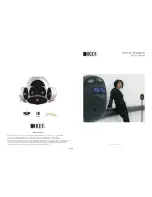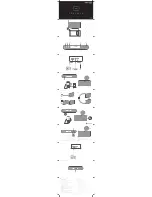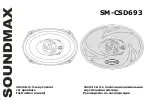
6.
Cleaning
– The unit should be cleaned only using a warm damp cloth. Do not use oily solvents or
chemicals. Rinse the unit off with tap water after use in salt water or swimming pool.
7.
Objects and Liquid Entry
– Care should be taken so that objects do not fall and liquids are not spilled
into any openings or vents located on the product. Keep gasket free of dirt, sand, or objects that could
interfere with a proper watertight seal.
8.
Attachments
– Do not use attachments not recommended by the product manufacturer.
9. L
ightning and Power Surge Protection
– Unplug the unit from the wall socket and disconnect the
antenna or cable system during a lightning storm or when it is left unattended and unused for long
periods of time. This will prevent damage to the product due to lightning and power-line surges.
10.
Overloading
– Do not overload wall sockets, extension cords, or integral convenience receptacles as
this can result in a risk of fire or electric shock.
11.
Damage Requiring Service
– The unit should be serviced by qualified service personnel when:
A. the power supply cable or plug has been damaged.
B. objects have fallen into or liquid has been spilled into the area under the rubber gasket.
C. the unit has been dropped or the enclosure damaged.
D. the unit exhibits a marked change in performance or does not operate normally.
12.
Periods of Nonuse
– If the unit is to be left unused for an extended period of time, such as a month
or longer, the power cable should be unplugged from the unit to prevent damage or corrosion.
13.
Servicing
– The user should not attempt to service the unit beyond those methods described in the
user’s operating instructions. Service methods not covered in the operating instructions should be
referred to qualified service personnel.
Questions? Visit www.ihome.com
or call 1-800-288-2792 Toll Free
11



































